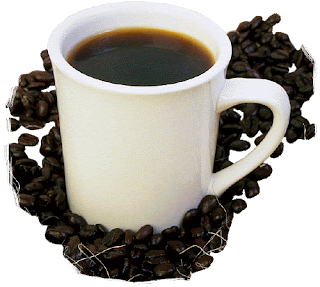
Coffee highs and lows.
[Excerpted from “Caffeine: Pharmacology and Effects of the World’s Most Popular Drug,” by Kyle M. Clayton and Paula Lundberg-Love, in The Praeger International Collection on Addictions Volume 2]:
-- Caffeine dependence is not presently recognized as a clinical disorder in the American Psychological Association’s DSM-IV-TR. Caffeine intoxication, however, is listed as a distinct clinical syndrome. Most of the symptoms of caffeine intoxication resemble symptoms of cocaine or amphetamine overdose: anxiety, insomnia, restlessness, tremor, irritability, rambling speech patterns, and irregular heartbeat. “In adult cases of highly elevated doses,” the authors write, “symptoms such as fever, hallucinations, delusions and loss of consciousness have occurred.”
--In high enough doses, caffeine is extremely toxic and can lead to death. The good news: This almost never happens, since the potentially lethal dose is on the order of 50 to 100 cups of coffee, quickly consumed. There is, however, the theoretical risk that an overdose of caffeine tablets could be fatal.
--Caffeine tolerance develops in a hurry. Tolerance to the sleep-disrupting effects of coffee in high doses can occur after only seven days of consuming 400 mg of caffeine three times a day—using 120 mg per cup as a rough average, that amounts to about ten cups of strong coffee per day. The researchers report that “complete tolerance to subjective effects such as nervousness, tension, jitters and elevated energy were observed to develop after consuming 300 mg three times per day for 18 days, and it is possible that such tolerance can occur within a shorter period of time.”
--Caffeine can interfere with the effectiveness of benzodiazepines and other medications that act on the neurotransmitter GABA. “Caffeine can inhibit the binding of benzodiazepines to their specific receptors on the GABA-A receptor sites, therefore neutralizing the effects of such medications and inhibiting their sedative hypnotic effects. Such interactions should be considered when evaluating the effectiveness of medications used to treat insomnia.”
--Conversely, caffeine can enhance the effectiveness of pain relievers. In particular, caffeine allows for faster absorption of headache medications, producing faster relieve at lower doses. Nicotine increases the rate at which the body metabolizes caffeine. Abstinent cigarette smokers often discover that their usual intake of coffee causes jitters and a bad stomach once they quit smoking. Some researchers have speculated that a high level of caffeine intake during smoking cessation might cause an increase in nicotine withdrawal symptoms.
Photo Credit: www.healingwithnutrion.com
